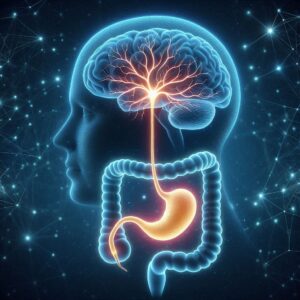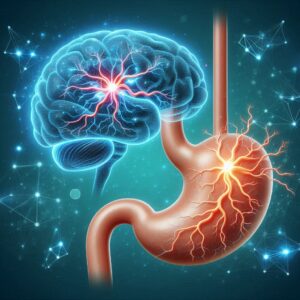We all know the feeling — bloated, acidic, full of gas, and unable to pass a decent stool.
So you book an appointment with a gastroenterologist, get all the tests done, pop the prescribed pills, and avoid spicy food like the plague.
But weeks pass… and your gut still feels like a war zone.
So what’s going on?
You’re not alone. I’ve met countless patients, who’ve come after rounds of gastro consults, endoscopies, colonoscopies — the whole nine yards — with zero relief.
One patient of mine, let’s call her Ritika, told me, “Doctor, my stomach controls my life. I can’t eat without worrying, I cancel plans, and I’m always watching the toilet.”
After months of physical treatment with no answers, her biggest discovery came when we addressed her anxiety.
The Gut-Brain Link Is Real

The gut is often called the “second brain.” And it’s not just a poetic metaphor. Your gastrointestinal system is directly linked to your central nervous system through the gut-brain axis.
When your mind is disturbed — with stress, anxiety, depression, or even past trauma — your gut doesn’t stay silent.
Some common psychiatric causes of persistent gastric issues:
- Generalized Anxiety Disorder (GAD): Constant worrying, overthinking, restlessness. It tightens the gut.
- Panic Disorder: Sudden spikes of anxiety can lead to nausea, bloating, diarrhea.
- Somatoform Disorders: Emotional distress showing up as physical pain, especially gut-related.
- Depression: Slows gut motility. Leads to constipation, heaviness, lack of appetite.
- Health Anxiety (Hypochondriasis): Constant checking, googling symptoms, feeling worse with every passing hour.
Symptoms That May Seem Gastric, But Aren’t Just Physical:
- Bloating after eating even small meals
- Burping or heartburn that worsens during stressful periods
- Constipation alternating with loose stools
- Feeling like something is stuck in the gut
- Nausea without any visible cause
- Gas even when your diet is clean
- Stomach tightness especially when nervous
History & Etiology: Where Does It Begin?
Many of these patterns start early in life — childhood trauma, overly strict environments, high-performance pressure, or chaotic households.
By adulthood, these unresolved emotions take shelter in the gut.
Your autonomic nervous system begins to overreact. It thinks you’re always in “fight or flight,” and the digestive system suffers as a result.
Epidemiology – How Common Is This?
- Studies suggest over 60% of people with Irritable Bowel Syndrome (IBS) also suffer from anxiety or depression.
- More women are affected than men.
- Young adults (ages 20-40) are the most commonly affected group, especially urban professionals juggling careers, family, and digital stress.
Pathogenesis – What Happens Inside?

Stress triggers the hypothalamic-pituitary-adrenal (HPA) axis, releasing cortisol (stress hormone).
This disrupts the natural rhythm of digestion:
- Gut motility is impaired.
- Acid production becomes erratic.
- Intestinal permeability increases (also called “leaky gut”).
- The gut microbiome becomes imbalanced.
The result?
Even if your gastro tests look “normal,” you feel terrible.
So, What Should You Do?
If you’ve done the scans, followed the diet plans, taken the antacids and probiotics —
but still feel miserable, it’s time to consider the mind-body approach.
A psychiatrist won’t just give you a pill — we look at the emotional landscape behind your symptoms.
You may need:
- Cognitive Behavioural Therapy (CBT)
- Mindfulness and relaxation training
- Anti-anxiety or low-dose antidepressant meds (which also improve gut motility)
- Polyvagal-based nervous system regulation
You’re Not Imagining It.
You’re not weak. You’re not “just stressed.” You’re not a hypochondriac.
You’re a human being whose brain and gut are more connected than medicine used to believe.
And healing isn’t just in the stomach — it starts with the mind.
📞 Need to talk?
Mind & Mood Clinic, Nagpur (India)
Dr. Rameez Shaikh, MD (Psychiatrist & Counsellor)
📞 +91-8208823738
We understand the invisible connection between gut and mind.
Disclaimer:
This blog is for informational purposes only and does not replace professional medical advice. Always consult a licensed psychiatrist or gastroenterologist for diagnosis and treatment.
Blog written by Dr. Rameez Shaikh, MD – Psychiatrist & Counsellor, Mind & Mood Clinic, Nagpur.

Dr. Rameez Shaikh (MBBS, MD, MIPS) is a consultant Psychiatrist, Sexologist & Psychotherapist in Nagpur and works at Mind & Mood Clinic. He believes that science-based treatment, encompassing spiritual, physical, and mental health, will provide you with the long-lasting knowledge and tool to find happiness and wholeness again.
Dr. Rameez Shaikh, a dedicated psychiatrist , is a beacon of compassion and understanding in the realm of mental health. With a genuine passion for helping others, he combines his extensive knowledge and empathetic approach to create a supportive space for his patients.
